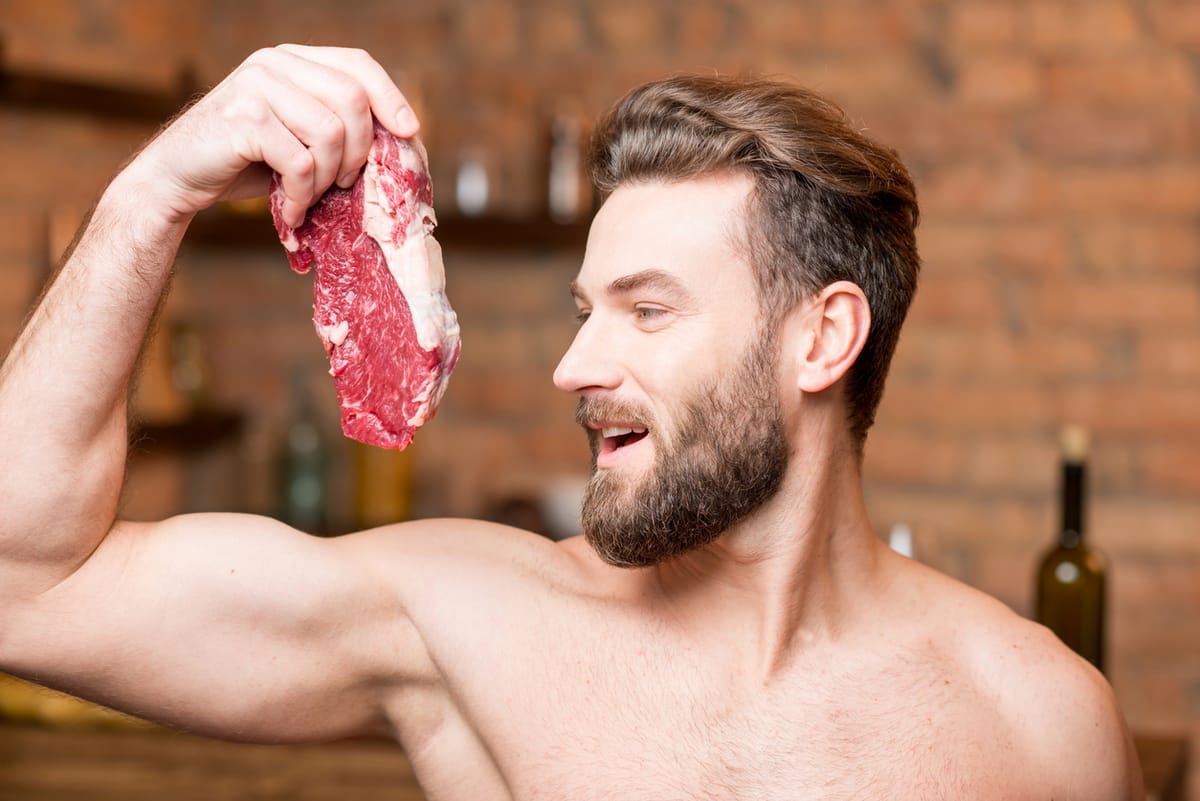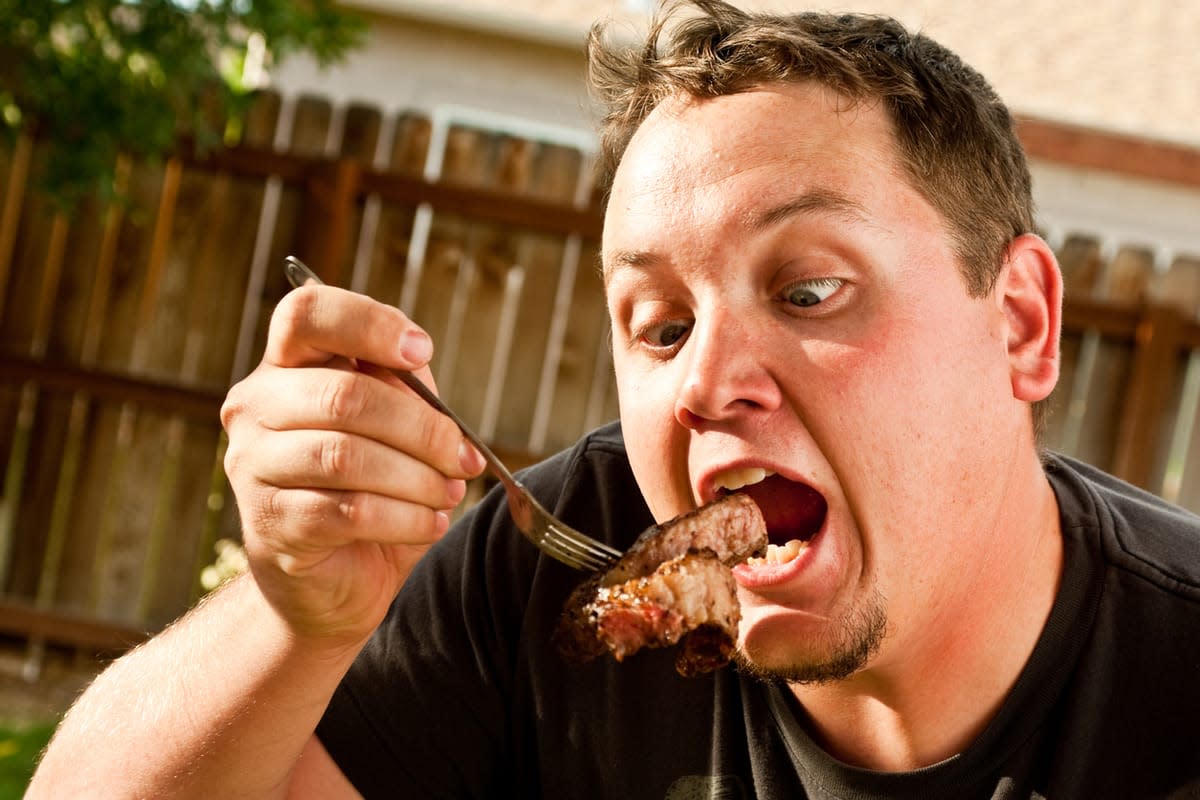
What does a man order when he wants to impress a woman on a dinner date? Will he summon the sommelier, discuss terroir and select an expensive wine? Will he wear a suit?
Or will he simply ask for a steak?
A sexually motivated man is more likely to order meat, according to research by Eugene Chan, from Monash University’s Department of Marketing. Dr Chan’s investigations with Natalina Zlatevska from the University of Technology Sydney show that men’s motivations for ordering meat go further than a preference for its texture and taste.
Meat confers status, he says.
“In evolutionary terms, there’s this perception that people who ate meat, especially red meat, were stronger and more dominant. And so when men are motivated to make themselves attractive to the opposite sex, although they might not be able to increase their financial wealth overnight, by choosing meat they symbolically convey that they are a person of wealth. Meat is usually more expensive, and they want to display that.”
Dr Chan began researching what prompted people – especially men – to eat meat, because he’s concerned that the habit is unhealthy for individual carnivores and also for the planet. Globally, livestock production produces more greenhouse emissions than transport. “Our way of eating is not sustainable,” he says.
Yet, per capita meat consumption continues to rise both in the developing and industrialised worlds. Dr Chan wondered how people could be persuaded people to change their eating habits for the greater good. Learning what motivated men to eat meat in the first place seemed like a promising research topic.
Evolution and food

The study of evolutionary factors in food choice has been little-explored, he says.
“I had a lay understanding of how people work in different societies,” he says. “Usually, it’s the men who eat more meat. And prior research has shown that meat is a masculine type of food. We extend that to show that it’s not just a masculine food, it’s also a high-status, displaying type of food.”
His research has shown, for instance, that men who perceive their socio-economic status to be low “express a greater preference” for meat and eat more of it because “meat symbolises the status that they lack but desire”.
The finding that men eat meat when they’re sexually motivated came after his research on meat-eating and status. The idea that sex might be a factor arose because “signalling status is one way to help men achieve their mating goals”. This research also indicates that sexually motivated women “like meat less”.
Why? “We don’t have a firm, conclusive answer for women, but our findings and data suggest that it could be because women, when they’re motivated to make themselves more attractive to men, care more about their physical beauty. And meat, especially red meat, doesn’t really help with all the hormones and cholesterol. But eating fruit and vegetables helps women maintain the beauty and femininity that men are after – or at least gives them that perception.”
He says an overseas campaign by PETA (People for the Ethical Treatment of Animals) shows celebrities and sportspeople “who are in many ways attractive and sexy. Our findings suggest that this may actually contradict what they’re trying to achieve” – which is to stop people from eating meat.
Burger wins out
In one of Dr Chan’s studies, 878 Americans were divided into two groups. In one group, participants were asked to imagine spending a romantic evening with a highly desirable person of the opposite sex. Members in the other group were asked to imagine a night out with a friend of the same sex. The results showed that men on the hypothetical date were more likely to choose a beef burger than members of the friendship group.
“Sexual stimuli are abundant in modern society,” says Dr Chan. “If exposure to sexual stimuli can affect food choices, policymakers, health officials and food sustainability advisors need to be aware of this link.”
“It’s been culturally ingrained that meat is high in status. It’s very hard to change – but it’s not impossible."
So how might men be persuaded to turn off the barbie?
“The idea would be to downplay, or dissociate meat from status,” Dr Chan says. “Try to suggest that meat is not as high in status as they might think.”
He concedes that this is a tough message to sell. In the hierarchy of food, meat is at the top – the centrepiece of celebration dinners and family gatherings, for instance.
And in societies where the gap between rich and poor is wide, it could prove difficult to persuade those people who find meat hard to afford that a roast dinner does not convey prestige. Members of more egalitarian cultures, on the other hand, might be more easily convinced that their standing doesn’t depend on what they eat.
“It’s hard,” he says. “It’s been culturally ingrained that meat is high in status. It’s very hard to change – but it’s not impossible. The culture has to change, the economics has to change, but it’s not impossible.”
Question of health
The health findings on meat are becoming better-known, and could also prove persuasive. “There’s a connection between health and status,” he says. “If you’re healthy, it shows that you know how to make the right decisions, you’re confident, your self-esteem is higher.” (A generation of anti-tobacco messaging means that smokers, for instance, are now largely perceived as people who ignore health warnings and in some circles have pariah status.)
“And there’s this growing trend for organic foods,” he says. “Organic foods are usually more expensive. So, again, you could buy organic foods for the status that they bring. Not just because they’re cleaner and healthier.”
A willingness to act altruistically also confers status, so this could be part of an anti-meat strategy as well.
People in the not-for-profit, sustainability area have shown an interest in the research, which he hopes will be put to productive use.
But to return to the Valentine’s Day date – if the man orders a steak, can the woman deduce that he is trying to impress her?
“It’s possible, yeah,” Dr Chan says. “Or he may be too over-confident, or even cocky.”





